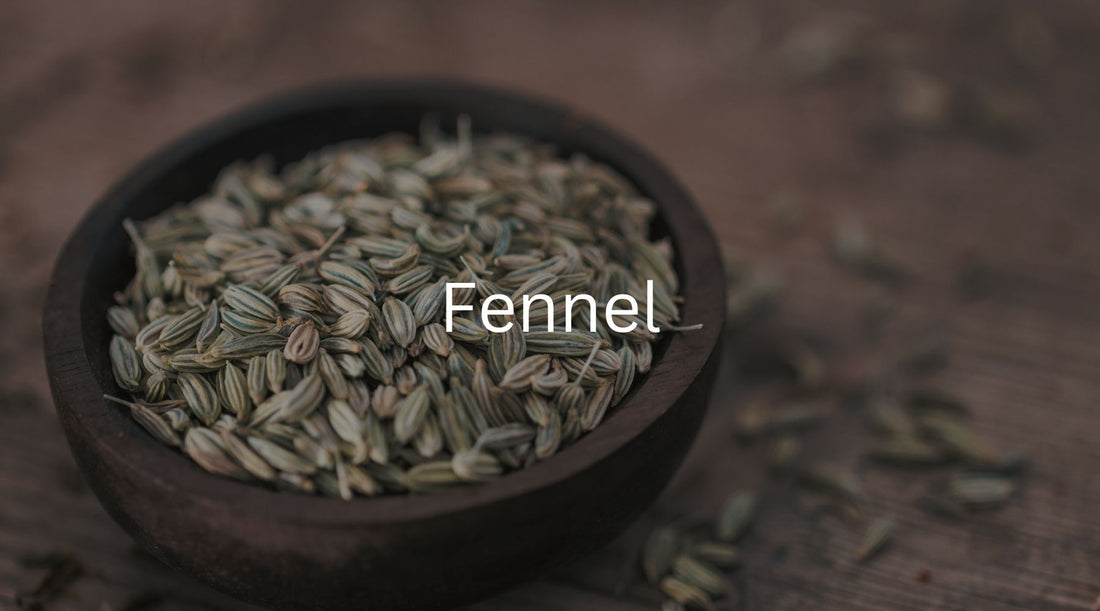Anxiety and stress can wreak havoc on your digestive system, leading to uncomfortable stomach problems like bloating, gas, and cramping. Fennel is a natural remedy that can help alleviate these symptoms and promote better digestion.
Fennel is a flavorful and versatile herb that has been used for medicinal purposes for centuries. One of the key benefits of fennel is its ability to support mental health and wellness. We'll explore how fennel can help alleviate stomach problems brought on by anxiety and stress, and how you can incorporate fennel into your daily routine with herbal tea.

History and Cultural Connections
Fennel has also played a role in various religious and cultural traditions. In ancient Greece, fennel was associated with Dionysus, the god of wine and fertility. It was also used as a symbol of victory and strength by athletes and warriors. In medieval Europe, fennel was believed to ward off evil spirits and witches. It was also used as an ingredient in love potions and aphrodisiacs.
In India, fennel seeds are often chewed after meals as a breath freshener and a digestive aid. In China, fennel is considered one of the five spices that make up the famous five-spice powder. In Italy, fennel is a staple ingredient in many dishes, especially in the region of Tuscany.

Benefits
While the research continues to grow around the helpful nature of fennel, take a look at some of the ways it is used today by many to support their mind and body.
Highly nutritious
Fennel is low in calories but rich in fiber, vitamin C, calcium, iron, magnesium, potassium, and manganese. These nutrients are essential for your immune system, bone health, blood sugar regulation, and wound healing. One cup of raw fennel bulb provides 12% of your daily vitamin C needs and 8% of your daily potassium needs.
Powerful plant compounds
Fennel and its seeds contain over 100 different phytochemicals, including antioxidants, anti-inflammatory agents, and antibacterial substances. Some of the most notable ones are anethole, rosmarinic acid, quercetin, and apigenin. These compounds can protect your cells from oxidative stress, inflammation, and infection.
Digestion
Fennel has been used for centuries as a natural remedy for digestive issues like bloating, gas, constipation, and irritable bowel syndrome (IBS). Fennel can help relax the muscles of the digestive tract, reduce inflammation in the bowels, and inhibit the growth of harmful bacteria that cause gas . You can chew on some fennel seeds after a meal or drink some fennel tea to ease your digestion.

Preparation and Quality
I like to use two teaspoons of fennel for 16oz of boiling water. I let it steep for 10-15 minutes for maximum extraction of the essential oils and strong flavor.
The quality of fennel you use also has a major impact on the flavor and effectiveness. I once bought a pound from a large retailer and it smelled horrible when I opened the package. It didn’t smell bitter nor did it smell sweet. I checked the date and it was about to expire in two months.
For quality you will want to check the date of expiration as a general guideline. To move beyond that, start smelling your fennel. It should have a strong scent that is “fresh” not dull or sweaty smelling. The flavor of black licorice should be at the front of the flavor experience. If you are looking for fennel only tea, check if you are getting sweet fennel or bitter fennel. Some blends might have a combination of both because of the flavor profile it creates.
How to make fennel tea
One of the easiest ways to enjoy the benefits of fennel is to make fennel tea. You can use fresh or dried fennel seeds or leaves to brew a cup of aromatic and soothing tea. Here's how:
- Crush 1 teaspoon of fennel seeds with a mortar and pestle or a spoon.
- Boil 1 cup of water in a small pot or kettle.
- Add the crushed fennel seeds (or 1 tablespoon of fresh or dried fennel leaves) to a teapot or mug.
- Pour the boiling water over the fennel and let it steep for 10 minutes.
- Strain the tea and enjoy it hot or cold.
Like all things, find what you like and make adjustments as you go.
For blends, we provide a fennel and licorice blend. It’s a taste and feeling of comfort.
Options
When it comes to picking the right tea for the right moment, it is really up to your preferences. However, we recommend if you want a relaxing moment to unwind, stay clear of caffeinated teas. Our Bear Hug and Reishi Realms are perfect for an afternoon or evening cup of tea, and both contain fennel.
Precaution
When drinking herbal tea for anxiety or stress, it's important to remember that it's not a substitute for professional help. If you're struggling with mental health issues, it's important to seek help from a qualified healthcare provider. Herbal tea can be a supportive addition to your treatment plan, but it's not a replacement for professional care.
Citations
- Link - Effect of Foeniculum vulgare (fennel) on symptoms of depression and anxiety in postmenopausal women: a double-blind randomised controlled trial
- Link - Foeniculum vulgare Mill: A Review of Its Botany, Phytochemistry, Pharmacology, Contemporary Application, and Toxicology
- Link - Is fennel good for you? Health benefits, nutrition, and more.

